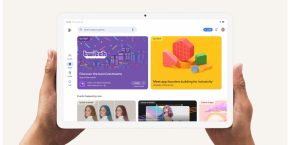
One major sore point for developers on the Google Play Store is the way in which the current ‘star rating’ system works. This year at I/O 2019, Google confirmed that there was a serious overhaul to the rating system heading to the Play Store.
Of course, app ratings are an integral tool used by potential buyers and developers alike. Reviews and ratings themselves help you make the right purchase decision, while developers can get valuable feedback for future updates and, indeed, future applications.
The current system is open to scrutiny as app ratings are continual, meaning that a rating from the initial launch of an application still bears the same weighting on your overall score as a rating from the most recent iteration. This isn’t great for developers of applications with extended shelf lives.
For example, your version 1.0 could have launched a few years ago and to a mixed response. The application might have therefore gone through a metamorphosis, several iterations years later and barely resembles the initial product. Now because of the current star rating system, those early mixed reviews will have a marked effect on the overall application rating.
While for static products like movies and music this makes no real difference, for applications it kind of is a strange way to manage rankings effectively. Google has said those that reply to app reviews see “users update their rating by +0.7 stars on average.”
Google has also shared that later this year, app ratings will only be weighted to reflect the most up-to-date version of an application. Furthermore, app developers will be able to see the new rating via the Google Play Console effective immediately. As for end users, we won’t be able to see this new system in action until August (via Android Authority).
Suggested replies for developers

That isn’t all that is happening on the Google Play Store front, a series of new additions being made for developers to take advantage of on their own application listings.
Firstly, there will be the ability to send ‘suggested replies’ as we saw added to Gmail earlier this year. It will allow devs to respond to reviews and app queries much faster, even if you may get a more generic response. Google is hoping that this will help get developers to actually respond directly to reviews rather than simply ignoring them altogether.
Like suggested replies in Gmail, they will work by offering responses based upon what the initial review contains. That should help developers give more specific responses much faster than previously. Suggested replies for reviews will only initially be available in English, but we do expect further language support to rollout in the not too distant future.
Custom landing pages
Developers will also get the ability to create custom landing pages for their apps, which should be music to the ears of many Android app developers out there.
This new addition will give devs the ability to point shoppers and browsers to a unique dedicated storefront depending on if they have the app installed already. It could help push more people to purchase or even entice previous customers to make an in-app purchase.
Each custom storefront can be customized to help boost application downloads and installs. Pre-registration custom listings and pre-registration rewards will play an integral role in these new controls for personalised landing pages.
Better auto app updates
At the moment app updates can be a little passive in how they notify you that an application is ready for a refresh. Google is now introducing a new in-app updates API, that allows you to push users to update an application while it is in use. Developers are now able to add pop-ups to appear on-screen to prompt users to download their most recent updates while the application is in use.
The API currently supports two flows for developers to utilize:
- The “immediate” flow is a full-screen user experience that guides the user from download to update before they can use your app.
- The “flexible flow” allows users to download the update while continuing to use your app.

New Google Play Console data

A new Google Play Console data tool is also heading the way of app developers who publish on the Google Play Store. These new metrics and insights will help devs better measure app health and analyze overall performance.
- Core metrics refresh — better understand your acquisition and churn, including data on returning users, automatic change analysis, install method (such as pre-installs and peer-to-peer sharing), metric benchmarking, and the ability to aggregate and dedupe over periods from hours to quarters.
- App size metrics and reports — gain insights about your app size in Android vitals, including download size, size on device (at install time), changes compared to peers over time, and tailored optimization recommendations.
- Developer-selected peer benchmarks — create a custom set of 8-12 peers to compare your app to, then see the median value of the set and the difference between your app and its peers for Android vitals data as well as for public metrics like your rating.
- Market insights with curated peersets — in the coming months, you’ll also be able to compare your growth against an automatically generated, curated peerset of around 100 apps similar to yours for business-sensitive metrics like conversion rate and uninstall rate.
It’s worth noting that many of these new features will not affect the day-to-day experience of general Android users on the Play Store bar the new Google Play Store ratings system. But for developers, the added tools are available right now.
More on the Google Play Store:
- Pending Transactions will allow you to make Google Play Store purchases with cash
- Here’s the redesigned Google Play Store for Android TV, coming later this year
- 2019 Google Play Award winners highlight top Android apps and games
FTC: We use income earning auto affiliate links. More.



Comments